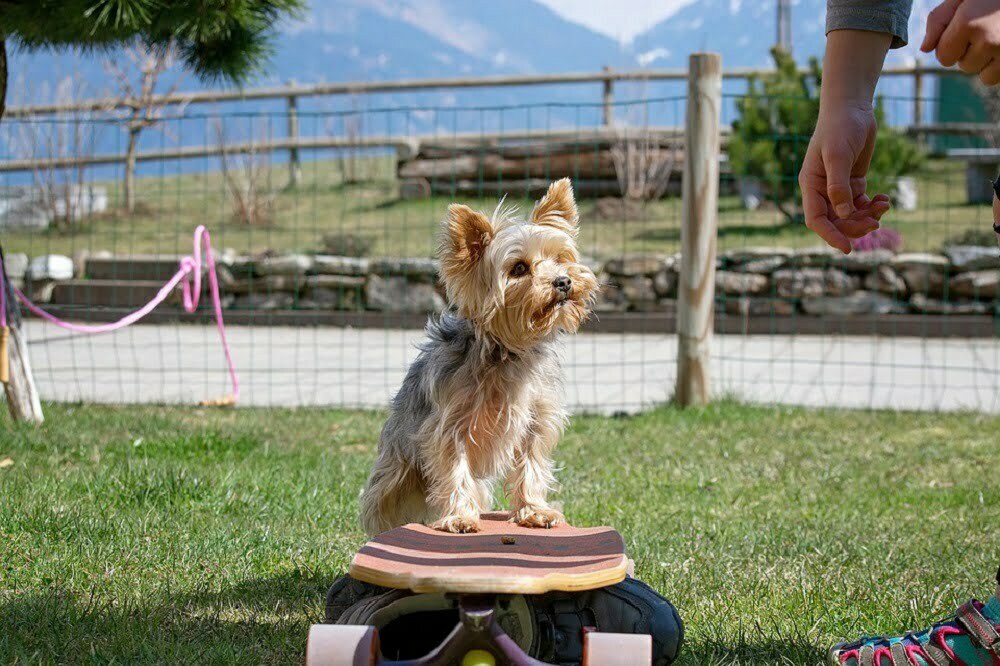Yorkshire Terriers, or “Yorkies” as they’re affectionately known, are prized toy dogs due to their majestic appearance and sassy attitude. Now a pristine lap dog, Yorkies are equally adored for their long, silky, two-toned coat and perky topknot.
This dog breed is excellent for single owners and larger families due to its lovable, over-protective, and larger-than-life personalities. Yorkies are full of adventure and sometimes a little bit of trouble, but like all good dogs, they also have an endearing, softer side.

So, if you’re thinking of adopting a Yorkshire Terrier, or simply want to know a little bit more about the popular toy dog breed, then look no further.
This guide will take an in-depth look at the Yorkshire Terrier, including all the essential information relating to their temperament, health, trainability, and much more. We’ll also look at the history of the popular breed, a few interesting facts, and some of the frequently asked questions.
Key Facts And Appearance
On average, Yorkshire Terriers, like most toy breeds, have a lifespan of between 11-15 years. This, of course, relies on them having a good quality of life, with a well-balanced diet and an appropriate amount of exercise.
In theory, Yorkies can get the majority of their exercise indoors. However, they may become too hyped-up if they’re forced to exercise by only running around the house. Dogs that dash around in an enclosed environment jumping and barking are keeping themselves in an excitable, over-stimulated state of mind, which isn’t psychologically healthy.
Therefore it’s beneficial to take your Yorkshire Terrier outside. You can keep them in an apartment or house with no yard, but they’ll be much happier with an outdoor fenced area, no matter how small, to stretch their legs and run around.
In terms of their appearance, Yorkshire Terriers are a well-proportioned, small dog breed. They usually take around 3 years to grow into mature coats, starting with a darker brown, black fur coat and then evolving into a lighter brown and gray color, often referred to as a “blue” coat.
Their coats of fur – which are naturally straight and hang evenly off their body – are also hypoallergenic. This means that they’re low-shedding and tend to produce less dander – ideal for people who suffer badly from allergies.
Interestingly, Yorkies tend to become lighter with age, while hormonal changes can also affect the color. Furthermore, females generally go lighter in heat and then darken again after their season is over.
Other features of a Yorkie’s appearance include a small head, a medium-sized muzzle, high v-shaped ears, and a compact body with a level back.
For typical size and growth levels, the average adult Yorkie will grow to a height of 17-20cm (7-8 inches). They also weigh, on average, approximately 3kg, which is only around 7 lbs.
Temperament
Although they may look cute and dainty, Yorkshire Terriers come with a big personality. They’re known for being active, fond of attention, over-protective, and require a good amount of daily interaction to keep them happy and stimulated. This over-protective nature is ideal for families who want a watchdog of their home as they tend to bark a lot.
Like many toy dogs who are oblivious to their small size, Yorkies often have “little man syndrome,” meaning that they’re a big dog in a small body, constantly on the lookout for adventure and sometimes a bit of trouble.
Despite this “little man syndrome,” Yorkies have a softer side and love to be the center of attention, spending plenty of time with their owners. Therefore, a Yorkshire Terrier may not be the right fit if you’re someone who leaves the house for hours on end.
For city-dwellers, very few dogs thrive as much in flats and big-city living as Yorkies. This is mainly because of their size but also due to their excellent personalities.
As long as they have a calm and comfortable residence to come home to and get some exercise each day, they should be healthy and happy.
Sociability
Yorkshire Terriers are affectionate towards people they know and feel comfortable around. However, they’re still a terrier by blood, so that they can be understandably suspicious of strangers.
Most Yorkies are quick to announce unfamiliar guests at the door with a fair amount of barking. Once the visitor comes in and takes a seat, some Yorkies will settle down and become friendly and outgoing, while others will remain standoffish and suspicious.
In terms of their sociability with children, many experts recommend Yorkies to be with older children who’ve been taught how to treat and respect them rather than small children and young toddlers.
This is mainly because of two reasons. Firstly, babies and toddlers are at greater risk of hurting a Yorkie than a larger breed, as they can often be curled up under a blanket or pillow and unintentionally stepped on. Secondly, Yorkies can become defensive or snappish if started or teased.
Despite these risks, Yorkies are generally great with children of all ages. So, as long as you’re willing to protect your Yorkie from your little ones, and vice versa, age shouldn’t be anything to worry about.
If you have other pets, such as cats, in your household, the majority of Yorkies are great with them, especially if socialized at an early age. However, it can be risky to keep some of the smaller Yorkies with a larger dog. This is because toy dog breeds can be injured simply by a larger dog jumping and playing around with an abundance of enthusiasm.
Yorkies are bold in their approach to strange dogs, so if you’re out for a walk and they spot another dog, it’s likely that they’ll act a little bossy and scrappy. This is typically seen through barking and lunging. Furthermore, the bigger the dog, the more demonstrative a Yorkie seems to be.
Health

The leading health problem in Yorkies is injury. Dislocated kneecaps, also known as luxating patella, is especially prevalent, with all Yorkies fond of jumping around. In fact, Yorkshire Terriers have the 2nd highest rate of the luxating patella of all breeds, with roughly 1 in 4 Yorkies affected.
Another health issue to look out for in Yorkies is liver disease. This is usually hereditary and can become a severe problem in Yorkies. Therefore, it’s worth doing a simple blood test before you buy or adopt a Yorkie just to make sure that their liver is normal and healthy.
Moreover, it’s worth noting that liver disease can sometimes only be treated, not cured, and often requires tricky surgery that the dog may not survive.
Yorkies also have delicate digestive systems, so you’ll need to be careful what you feed them. If they’re showing signs of pain or discomfort after they’ve eaten something, it’s important to take them to the vet for inspection. Eating problems can also occur if your Yorkie has teeth or gum problems.
Furthermore, new environments, such as moving house or going on a weekend away, can also trigger illness. This illness is usually in the form of either diarrhea or vomiting.
Grooming
In terms of the correct grooming routine, daily brushing and upkeep are required for Yorkshire Terriers. While they shed very little, their hair is longer and more susceptible to knotting and matting.
Their hair is in some ways similar to human hair in that it needs to be brushed daily to keep its lustrous shine. It should also be washed and trimmed when needed. Failure to do so will leave your Yorkie with an uncomfortably long coat that may drag on the ground and pick up debris.
Yorkies also often have a little tuft of hair on the top of their head. This cute tuft of hair isn’t a fashion statement, however, and can become irritating for Yorkies if left ungroomed. Therefore, getting a fringe trim or putting it in a top bun is a good idea.
Yorkies are pretty much the same as any other dog for other grooming requirements. Weekly baths are recommended, while their nails should be trimmed at least every couple of weeks, and their teeth cleaned on a regular basis. This basic upkeep will help prevent your Yorkie from suffering additional health issues such as gum disease and ingrown hairs.
Trainability
Most Yorkies are quick and keen to learn, although this depends on what you’re trying to teach them. When it comes to tricks such as sit, paw, spin, and roll over, they tend to be great – especially if there’s the reward of a treat after they perform.
Positive reinforcement training is the best way to train a Yorkie as they love nothing more than pleasing their owners and receiving praise and treats for their efforts.
It’s much more challenging, however, trying to teach a Yorkie to walk properly on a leash. As mentioned earlier, they have strong personalities and can be very opinionated, so they often dislike the leash “telling them what to do.” This can be overcome by positive reinforcement on the occasions they behave well.
All things considered, there are 2 main behavioral problems in Yorkies. The first is housebreaking (training them to go to the toilet outside or in a specific place). This issue can be worse if you live in a particularly cold or rainy climate, as Yorkies hate both the cold and the rain.
The second problem is barking. Yorkies make excellent watchdogs with their heightened senses, but this does mean that they’ll bark at every new sight and sound. The best way to train them out of this is to strongly discourage them at an early age before excessive barking becomes an established habit.
In terms of their potential to bite, well-kept Yorkies don’t generally tend to engage in the practice. Just be mindful that some Yorkies have been known to bite if they haven’t been trained properly, so it’s always good to be careful. Establishing dominance with your Yorkie at a young age is important to make sure they grow out of the behavior.
History

The Yorkshire Terrier was developed in Yorkshire, England, during the 19th and Victorian eras. A Yorkie was created to be tough, not sweet, with possible connections to the Clydesdale, Paisley, and Skye terriers.
Most of the historical information relating to Yorkies is uncertain. However, many believe they were bred by working men in Northern England who couldn’t easily keep large dogs but still wanted a feisty and loyal companion.
Another theory states that Scotsmen working in Yorkshire wool mills brought the Clydesdale terrier from Scotland and developed the Yorkie breed during the Industrial Revolution.
Regardless of the true reason behind being brought to England, there’s no doubt where they got their name from – Yorkshire.
Yorkies first became recognized as their own breed by the British Kennel Club in 1874. Furthermore, the first official Yorkshire Terrier breed club was formed in England in 1898.
Yorkies didn’t make their way over to America until the 1870s. Nevertheless, their popularity has continued to grow at a fast rate ever since.
Fun & Surprising Facts
- A brave Yorkie named Smoky served as a war dog during World War II, working alongside the U.S. Army Corporal William Wynne
- Yorkies have held the world record for the smallest dog multiple times – the latest being Big Boss, who, at 4.7 inches, held the record from 1995 to 2002
- The Yorkie breed closely resembles the silky terrier, so people often mix the two up when trying to identify them
- Carrying a Yorkie in a bag or purse and never leaving them out of sight is actually bad for the dog as the coddling leads to them becoming insecure and having separation anxiety from their owners
- Yorkshire Terriers are prone to pharyngeal gag reflex, or reverse sneezing, which instead of pushing air out of the nose like a normal sneeze, will have them gasping for air and making a goose-like honking sound
Frequently Asked Questions
How Much Is A Yorkie Puppy?
A well-bred Yorkie can cost anywhere from $1,500 up to $3,000. It’s worth noting, however, that prices can vary depending on the Yorkie’s appearance, lineage, health, and breeder. It’s also possible to adopt an older Yorkie through rescue for significantly less.
How Often Does A Yorkie Need To Eat?
Due to their small size, Yorkshire Terriers should be fed 3-4 times a day, with their meals spread out evenly to ensure that their blood sugar levels don’t drop. This could lead to a small dog, such as a Yorkie suffering from hypoglycemia. Puppies need to be fed a little more frequently, although their meals again should be spread evenly throughout the day.
What Age Does A Yorkie Stop Growing?
This all depends on a puppy’s genes and bloodlines, so if you’re curious, it’s a good idea to ask a breeder who would be the best person to know. Some Yorkie puppies stop growing around the 6-month mark, whereas others may take a little longer to mature, up to 9-10 months.
How Many Hours Do Yorkie Puppies Sleep For?
Yorkie puppies tend to sleep for most of the day, with some even sleeping for up to 22 hours each day. This is required, however, as it allows them to grow and develop properly. As Yorkies mature with age, they sleep far less, usually anything from 13-18 hours a day.
Are Yorkies Aggressive?
Yorkies aren’t generally aggressive, but it’s worth bearing in mind that all puppies, regardless of breed, learn to bite when they’re young. Therefore, it’s important to encourage Yorkie puppies not to do so as soon as they arrive in their new homes. Playtime and games should never involve biting as this can lead your Yorkie into thinking that it’s an acceptable practice.
